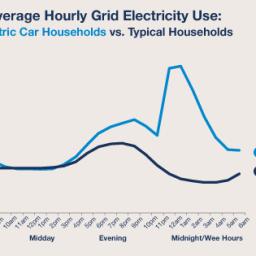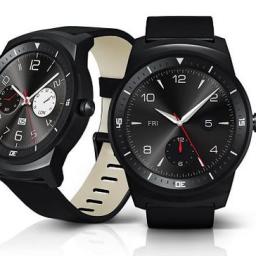 By day:
By day: electric vehicles are taking the world by storm: their sales are doubling every year, their fuel efficiency is off the charts, and some of them can even accelerate from 0-60 mph about as fast as you can say Elon Musk.
By night: the electric vehicle (EV) community continues to make waves. While you are in bed dreaming about how some day you too might own an electric car, many EV owners are doing something dramatic; something unusual; something that is reshaping the energy landscape.
They are using gobs of electricity.Read on for some great statistics and graphs. Check out the consumption spike that occurs after dinner.

Techcrunch is onto a mystery that should be no surprise to anyone who uses these things on a daily basis:
tablet sales are waning, while sales of computers are actually rebounding. Author and former CIO Peter Yared has the solution:
Businesses Need Super Tablets.
As the former CIO at CBS Interactive, I would have bought such super tablets in droves for our employees, the vast majority of whom primarily use only a web browser and Microsoft Office. There will of course always be power users such as developers and video editors that require a full-fledged PC. A souped-up tablet would indeed garner corporate sales, as Tim Cook would like for the iPad " but only at the expense of MacBooks.
The cost of managing PCs in an enterprise are enormous, with Gartner estimating that the total cost of ownership for a notebook computer can be as high as $9,000. PCs are expensive, prone to failure, easy to break and magnets for viruses and malware. After just a bit of use, many PCs are susceptible to constant freezes and crashes.
What say the Pipedot faithful: Is this just a twist in the business cycle? Would a super-tablet convince you to dust off the credit card? Or is TechCrunch just grasping at straws?
I personally have to manage upwards of 180 passwords on a regular basis and lots of folks deal with more than that. Sure, you can simplify by reusing passwords, but common sense says that's a bad idea. But better systems inevitable require you manage them in a password app or equivalent, which opens another vulnerability, as cracking that data store can net a crook your entire password collection. Clearly, there's progress to be made here.
The reported theft of 1.2 billion email passwords by Russian hackers earlier this month was just the latest in a long string of major password security breaches that have led some people to wonder if the use of passwords should be abandoned.
But given recent breaches of systems and so on, the BBC is asking the inevitable question, which is
has the flawed password system finally reached its end, and if so, what will replace it? Check out their review of alternatives, including digital portraits, voice recognition, and more.
What about Pipedotters: how do you manage your passwords, and which direction makes sense for this not-evolving-fast-enough technology?

We're getting there, slowly. There's a new range of smartwatch in town, and they're getting better and more attractive. In the words of the Motley Fool financial blog,
Samsung and LG have upped the ante on smartwatches.
Here's Samsung's new Gear S:
Their latest watch is the Samsung Gear S, and it's one of the only smartwatches on the market that sports 3G connectivity. This allows it to function on its own without having to be forever tethered to a smartphone to access notifications and other content.
The other unique feature of the Gear S is its 2" curved OLED display with a resolution of 320x480. Samsung believes that a convex display allows for a more ergonomic and comfortable smartwatch. With its curved rectangular display the form factor of the Gear S is like a cross between fitness bands and smartwatches.
LG has released a new one too, and it's round and surprisingly traditional looking.
The G Watch R's circular touchscreen measures 1.3 inches versus the G Watch's rectangular 1.65-inch screen. The G Watch R's display has a higher resolution (320 i- 320 pixels) compared with the G Watch's (280 i- 280 pixels). That means images viewed on the G Watch R should look much sharper than those viewed on the standard G Watch. The G Watch R also uses plastic OLED display technology rather than the LCD technology used with the G Watch. As a result, LG says, the G Watch R will be easier to read in direct sunlight.
With so many models and so many new features, and yet so many missing features, the tech press is already jaded. Check out TechRadar,
who asks, "Does anybody even care anymore?" while simultaneously admitting, err,
they do.
[Ed. note: I'm definitely in the market, and they're getting closer to making me reach for my wallet!]
Hoping we'll do two short polls again this week. Here's the first one:
We're doing lots of articles focusing on computer science, hardware, gadgets, software, but there's room for growth in the sciences. But which ones?
This is a borda poll, so number the fields in your preference, where 1 is the scientific field you'd be most likely to click on, and 10 is the field you'd be least likely. We'll see which fields float to the top, and you'll likely see more articles from those fields in the future (unless you choose numerology, in which case I'm outta here). I've got 250+ feeds in my RSS reader now. Let's see whose articles are going to make it into the fabric of Pipedot!
The poll is on the right side of the home page. Happy clicking!
 By day: electric vehicles are taking the world by storm: their sales are doubling every year, their fuel efficiency is off the charts, and some of them can even accelerate from 0-60 mph about as fast as you can say Elon Musk.
By day: electric vehicles are taking the world by storm: their sales are doubling every year, their fuel efficiency is off the charts, and some of them can even accelerate from 0-60 mph about as fast as you can say Elon Musk.
